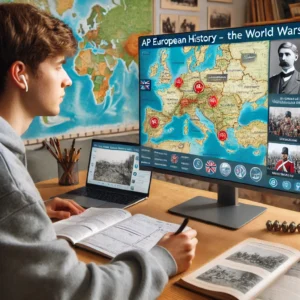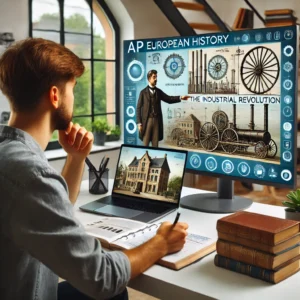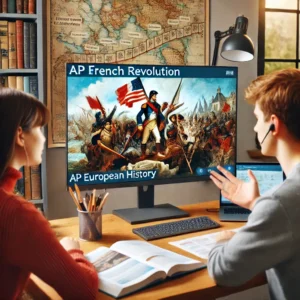AP European History Tutor from India
Noble Learners is an online tutoring platform which provide one to one tutoring to the students from US. We provide tutoring for all the subjects as per the US Curriculum along with the AP European History Tutoring. Our tutors are well qualified and have good command on European History. They are the graduate students in history from Central Universities.
They can clear the all the concepts related to European History. We also take integrated approach we prepare the students for their high school so that they can score good GPA, but at the same time, we make them prepare for AP European History Exam which is held every year in the month of May. It is important to know that getting good credit help the students to get a good college in the US for Undergraduate Program.
Our AP European History Tutor from India are also provide the personalizing worksheets to cater the needs of student. We also have our application where we provide you free practice papers and contents with worth more than 1000 dollars.

AP European History Syllabus
1. Renaissance and Exploration (c. 1450–1648)
- Origins of the Italian Renaissance: Art, Literature, and Humanism
- The Reformation: Causes, Key Figures, and Consequences
- Age of Exploration: European Expansion and Impact on Global Trade
2. Absolutism and Constitutionalism (1648–1815)
- Rise of Absolute Monarchies: France, Russia, and Prussia
- English Civil War and the Glorious Revolution
- Development of Constitutionalism
3. The Scientific Revolution and Enlightenment
- Advances in Science: Contributions of Copernicus, Galileo, and Newton
- Enlightenment Thinkers: Locke, Rousseau, Voltaire, and Kant
- Influence of Enlightenment Ideas on Political and Social Reforms
4. French Revolution and Napoleon (1789–1815)
- Causes and Key Events of the French Revolution
- Rise and Reign of Napoleon Bonaparte
- The Congress of Vienna and Its Legacy
5. Industrialization and Its Effects (1815–1914)
- Industrial Revolution: Technological Innovations and Social Changes
- Rise of Capitalism and Labor Movements
- Nationalist Movements and Unification of Italy and Germany
6. World Wars and Totalitarianism (1914–1945)
- Causes and Impacts of World War I
- Russian Revolution and Rise of the Soviet Union
- World War II: Fascism, Nazism, and the Holocaust
7. Post-War Europe and the Cold War Era (1945–1989)
- Reconstruction and the Marshall Plan
- Division of Europe: NATO, Warsaw Pact, and the Iron Curtain
- Decolonization and the European Union
8. Contemporary Europe (1989–Present)
- Fall of the Berlin Wall and Reunification of Germany
- Globalization and Challenges in the 21st Century
- European Union: Achievements and Current Issues

Our Features
-
Expert Tutors From India
At Noble Learners, we pride ourselves on having a team of expert tutors who are not only well-qualified but also possess extensive teaching experience. Our tutors are well-versed in the Canadian curriculum, offering tailored guidance to students across Canada. This ensures that students get the best online tutoring experience from highly skilled professionals in India.
-
One-One-Tutoring
We understand that every student has unique learning needs. That’s why Noble Learners focuses on personalized, one-on-one tutoring. Our tutors act as mentors, offering individualized attention to help students achieve their academic goals. Many students have successfully improved their grades and excelled in exams with our personalized approach.
-
Flexible Timings
At Noble Learners, flexibility is key. We offer tutoring sessions at times that are convenient for the student, making it easier to balance school, extracurriculars, and other commitments. No matter your schedule, our tutors are available to accommodate your needs.
-
Live Sessions Via Zoom
All of our sessions are live, one-on-one classes conducted via Zoom. Unlike other platforms that offer pre-recorded courses, we believe in real-time learning. This ensures that students can get their doubts clarified instantly, improving their understanding. Our tutors are dedicated to addressing every student’s questions and providing comprehensive explanations.
-
Free Demo (30-Minutes)
Choosing the right tutor is crucial to academic success. That’s why we offer a free 30-minute demo class, giving students the opportunity to evaluate the tutor before making a decision. This trial session ensures that the student feels comfortable with the teaching style and content. After the first demo, you can even request a second free demo with another tutor if needed.
-
More than 50 teachers to choose from
With over 50 experienced tutors to choose from, Noble Learners offers a variety of options to ensure the perfect match for each student’s needs. If you're not satisfied with your first demo, you can explore a second demo with another expert. Please note that only two demo classes are free, and subsequent demo sessions may incur a charge.
-
Tutors from IITs, Medical Colleges, IIITs & Central University
Our tutors are exceptional individuals from prestigious institutions like IITs, Medical Colleges, IIITs, and Central Universities. They are accomplished graduates or final-year students who have cracked some of the toughest exams in their fields. With their rich experience in tutoring and deep subject knowledge, they bring passion, expertise, and proven success to help your child excel academically. Whether it’s simplifying complex concepts or inspiring confidence, our tutors know how to make learning engaging and effective. Your child learns from the best to become their best.
AP European History Exam Questions
1. Which of the following was a primary cause of the Protestant Reformation in the 16th century?
a) The rise of the Renaissance in Southern Europe
b) The invention of the steam engine
c) Widespread dissatisfaction with the Catholic Church's practices
d) The unification of German-speaking states
Correct Answer: c) Widespread dissatisfaction with the Catholic Church's practices
2. What event marked the beginning of the French Revolution?
a) The coronation of Napoleon Bonaparte
b) The Tennis Court Oath
c) The storming of the Bastille
d) The signing of the Treaty of Versailles
Correct Answer: c) The storming of the Bastille
3. Which European nation was most associated with the Age of Exploration in the late 15th century?
a) Germany
b) Portugal
c) Switzerland
d) Austria
Correct Answer: b) Portugal
4. The Peace of Westphalia in 1648 resulted in:
a) The end of the Thirty Years' War
b) The establishment of the Holy Roman Empire
c) The start of the French Revolution
d) The unification of Italy
Correct Answer: a) The end of the Thirty Years' War
5. What was a significant outcome of the Industrial Revolution in Europe?
a) Decline in urban populations
b) Rise in feudal agriculture
c) Increase in industrial production and urbanization
d) The abolition of slavery in Europe
Correct Answer: c) Increase in industrial production and urbanization
6. What was the primary goal of the Congress of Vienna (1814–1815)?
a) To promote liberal revolutions across Europe
b) To restore the balance of power and reestablish conservative monarchies
c) To create a European Union
d) To negotiate peace with Napoleon Bonaparte
Correct Answer: b) To restore the balance of power and reestablish conservative monarchies
7. Which Enlightenment thinker is best known for the idea of the social contract?
a) John Locke
b) Voltaire
c) Jean-Jacques Rousseau
d) Adam Smith
Correct Answer: c) Jean-Jacques Rousseau
8. Which event is often considered the immediate cause of World War I?
a) The signing of the Treaty of Versailles
b) The assassination of Archduke Franz Ferdinand
c) The Russian Revolution
d) Germany's invasion of Belgium
Correct Answer: b) The assassination of Archduke Franz Ferdinand
9. Which artistic movement emerged in Europe during the late 19th century and focused on emotions, imagination, and the sublime?
a) Realism
b) Romanticism
c) Impressionism
d) Baroque
Correct Answer: b) Romanticism
10. The unification of Italy in the 19th century was largely driven by which leader?
a) Otto von Bismarck
b) Giuseppe Garibaldi
c) Napoleon Bonaparte
d) Franz Joseph I
Correct Answer: b) Giuseppe Garibaldi
11. What was a major effect of the Printing Press during the Renaissance?
a) Increased access to education and spread of humanist ideas
b) Decline in religious influence
c) Rise of industrial capitalism
d) Collapse of feudalism
Correct Answer: a) Increased access to education and spread of humanist ideas
12. What was the purpose of Martin Luther’s 95 Theses?
a) To promote the sale of indulgences
b) To criticize corruption and practices within the Catholic Church
c) To form a new branch of Protestantism
d) To establish the Holy Roman Empire
Correct Answer: b) To criticize corruption and practices within the Catholic Church
13. The Treaty of Versailles placed the blame for World War I primarily on which country?
a) Russia
b) Austria-Hungary
c) Germany
d) France
Correct Answer: c) Germany
14. What was the Glorious Revolution of 1688?
a) The overthrow of King Louis XVI in France
b) The peaceful transition of power to William and Mary in England
c) The abolition of serfdom in Russia
d) The start of the Napoleonic Wars
Correct Answer: b) The peaceful transition of power to William and Mary in England
15. What was the primary goal of the Marshall Plan after World War II?
a) To punish Axis powers
b) To rebuild war-torn Europe and prevent the spread of communism
c) To establish NATO
d) To promote European imperialism
Correct Answer: b) To rebuild war-torn Europe and prevent the spread of communism
16. Which nation was the birthplace of the Industrial Revolution?
a) Germany
b) France
c) Great Britain
d) Italy
Correct Answer: c) Great Britain
17. What was the Edict of Nantes (1598) primarily intended to do?
a) Establish Catholicism as the official religion of France
b) Grant religious tolerance to French Protestants (Huguenots)
c) Promote the spread of Protestantism in Europe
d) Declare independence from the Holy Roman Empire
Correct Answer: b) Grant religious tolerance to French Protestants (Huguenots)
18. What was a significant result of the Peace of Augsburg (1555)?
a) The formal division of Christianity in the Holy Roman Empire
b) The end of the Hundred Years' War
c) The unification of Italy
d) The start of the Enlightenment
Correct Answer: a) The formal division of Christianity in the Holy Roman Empire
19. Who was the architect of German unification in the 19th century?
a) Giuseppe Mazzini
b) Otto von Bismarck
c) Charles de Gaulle
d) Franz Joseph I
Correct Answer: b) Otto von Bismarck
20. Which event marked the end of the Cold War?
a) The signing of the Treaty of Versailles
b) The fall of the Berlin Wall
c) The Cuban Missile Crisis
d) The start of the Korean War
Correct Answer: b) The fall of the Berlin Wall

